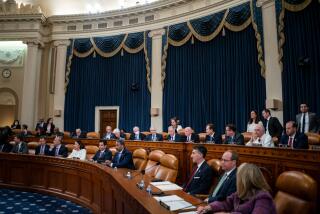As Romney hedges, White House cites ‘tradition’ of tax disclosure
The White House on Tuesday needled GOP front-runner Mitt Romney on releasing his tax returns, noting that it was the former Massachusetts governor’s father who set the precedent for such personal financial disclosure on the part of presidential hopefuls decades ago.
At his daily televised briefing, White House spokesman Jay Carney was asked about Romney’s hedging response to debate questions Monday night on the issue, and he had a ready answer.
“It’s not for us to call on someone to release his tax records, but it is an established tradition for presidential candidates to release their tax records,” said Carney, seeming to tread carefully so as not to veer too far into partisan commentary in his official duties as press secretary for the administration.
Carney noted that four years ago, then-Sen. Barack Obama released “multiple years of his tax records,” and has done so yearly since becoming president.
“We think it’s a good tradition,” he said, adding that he believed “it was a tradition that was initiated by then-presidential candidate George Romney back in 1968.”
It was one of Mitt Romney’s opponents in the GOP nominating race, Texas Gov. Rick Perry, who raised the issue of Romney’s taxes at Monday night’s 16th debate in Myrtle Beach, S.C.
Perry said it was important for Romney to release his tax returns “so the people of this country can see how you made your money” and decide “if we’ve got a flawed candidate or not.”
Romney declined to explicitly say he would release his tax records.
“If that’s been the tradition and I’m not opposed to doing that, time will tell. But I anticipate that most likely I am going to get asked to do that around the April time period and I’ll keep that open,” he said.
He addressed the issue again Tuesday in response to questions from reporters, saying the tax rate he paid on his income was “probably closer to the 15% rate than anything.”
When that point was brought up at the White House briefing, Carney invoked the administration’s push for a so-called “Buffett rule” that millionaires and billionaires should not pay a lower effective tax rate than the middle class.
Though he said he hadn’t spoken with the president about Romney’s situation in particular, Carney said it “illuminates what he believes is a is an issue, which is that everybody who’s working hard ought to pay their fair share.”
“And that would apply to somebody paying ... an effective tax rate of 15% on millions of dollars of income,” he said.
More to Read
Get the L.A. Times Politics newsletter
Deeply reported insights into legislation, politics and policy from Sacramento, Washington and beyond. In your inbox three times per week.
You may occasionally receive promotional content from the Los Angeles Times.










